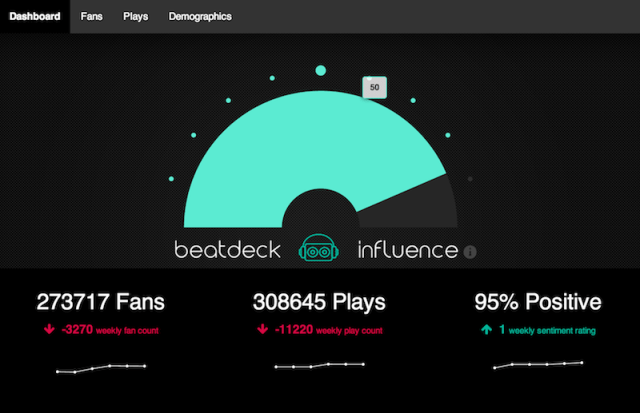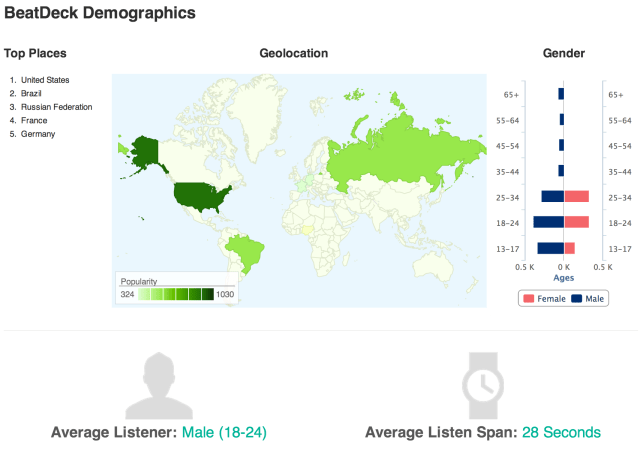Does my music do better on Facebook or Twitter? Where should my next tour be? Is my new song too repetitive? Musicians can get free answers to these questions and more from BeatDeck, a Y Combinator analytics company launching today. BeatDeck plans to license this data to labels and music stores to help them sign and recommend tomorrow’s superstars. Yep, BeatDeck is an enterprise music startup.
Everyone (who isn’t a cold-hearted robot) loves music. That’s led lots of entrepreneurs to start companies aiming to help listeners discover new artists and songs. But the fact is that selling music is a tough business. Selling what music to listen on someone else’s service is even tougher. BeatDeck is different. It does nothing for the listener. Zero consumer products. Instead, it focuses solely on the music industry — the artists, the labels signing them, and the stores selling them.

The first part of the equation launches today on BeatDeck.com. Artists sign up and connect their social media accounts like Soundcloud, Facebook, Twitter, YouTube, Instagram, and Last.fm. This lets them track their performance and compare it across channels, as well as see their fans’ age, gender, and location demographics. Artists also get fan influence and sentiment breakdowns thanks to reputation measurement and natural language processing.
For even deeper analytics about their music, artists can share their songs to social networks through BeatDeck’s publishing system. This gives them a heatmap of which parts of their songs users are skiping to, pausing at, or rewinding to so they can listen again. Conversion metrics indicate which channels best turn listeners into fans, and where they’re getting reshared. It’s valuable data mosts indie rockers don’t have the skills or time to track by hand. It could tell them where to book their next tour date, which part of their song to pitch for commercials, and which social networks they should focus on.
That’s phase one. Soon, BeatDeck will start selling enterprise licenses for its data to record labels and A&R departments (the people who decide which artists a label or management agency should sign). BeatDeck will let them monitor their artists and find new ones to catapult into fame. “We’re already in talks and worked out a couple of deals for enterprise solutions” says BeatDeck co-founder Josh Mangel. He explains that with just six big customers, which would have to include most of the big record labels, BeatDeck can be a sustainable business.

“Sustainable business” isn’t what being a startup is all about, though. BeatDeck will need additional revenue streams to truly succeed. Luckily, I was able to squeeze out of Mangel that the company is working on making its data useful to online music stores. One day it could have iTunes, Spotify, and Amazon paying it to tell them whose music to recommend to you. BeatDeck could tell them that people who try to listen to screechy industrial dubstep hero Skrillex, but pause 20-seconds in, should be recommended a lesser known artist like Robert Delong who is somewhat similar but easier to listen to.
There are plenty of music stores out there that could benefit from these kind of insights. BeatDeck will be battling it out with fellow music analytics services Next Big Sound and Musicmetric. However, they charge artists to monitor their music, and most musicians can’t afford to pay. BeatDeck’s free analytics for artists could win it lots of sign-ups who will fill it with data it can sell. It’s going to be a long, hard road convincing independent musicians that they need analytics, and bundling their data into something lots of companies want to buy.
In the end, the hope is that BeatDeck can help fledgling artists grow and get noticed by the bigwigs. Mangel concludes, “Right now the business isn’t really fair. Artists are not getting big because they’re talented, but because they’re backed by a lot of money. We want to make the music industry a meritocracy.”
